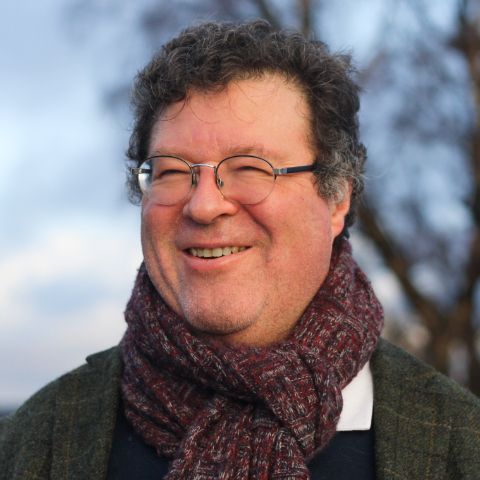Mist billows from a darkened stage as the curtain rises on Claus Guth’s production of Don Carlo. Gradually, the eyes adjust. The stage is surrounded by prison walls and Carlo – barefoot and bedraggled – lies hunched on the floor, transfixed by a beam of light. Bells toll. A diminutive figure in outsize breeches crouches by him; then leaps, capers and pirouettes off into the encompassing gloom. All this, and we’ve yet to hear a note of Verdi’s music.
In a moment stylised trees will descend and we’ll move to the forest of Fontainebleau. For now, Guth has laid out the basic terms of his interpretation: a sense of entrapment, the interplay of light and dark (Etienne Pluss’ designs favour monochromes), and the suggestion that what we are seeing is a flashback or projection of the prince’s damaged mind – although whether it represents grim reality or troubled dream (in the manner of Caldéron’s La vida es sueño) is left to us. Then there’s Guth’s own addition, a grinning jester played with manic glee by the director’s regular collaborator Fabián Augusto Gómez Bohórquez. We’ll come back to him in a moment.
Initially, though, it’s a thought-provoking set-up. Although the costumes (by Petra Reinhardt) are all-purpose Operatic-Edwardian (frock coats, wedding dresses), there’s a definite atmosphere of Velázquez: a world of chequered floors, court dwarves and deep, velvet darkness. Within this closed universe, Guth places Verdi’s characters like chess pieces, before letting them develop into increasingly complex human beings, a process supported by conductor Frédéric Chaslin. You’re pulled in without realising it. Carlo (Arnold Rutkowski) and Elisabeth (Jūlija Vasiljeva) sound so ardent together (Vasiljeva’s voice, in particular, has a luminous sweetness), and Chaslin supports them so sensitively, that you’re lulled into a false sense of security.
It's in Act 2 that the thunder really starts to roll. As Posa, Jānis Apeinis carries himself as nobly as he sings, and as we reach his heart-to-heart with Philip II (Günther Groissböck) Chaslin let fly with a raw, volcanic blast of low brass. From then on, we’ve glimpsed the abyss, orchestrally, and while Chaslin always moves things along tautly, the extremes (of emotion as well as sound) grow ever wider: screaming piccolos up top and sepulchral shadows engulfing the bass. It’s a thrilling sound world in which to follow, for example, Ester Pavlů’s trajectory as Eboli. By her final scenes, the effortlessly assured young woman (her singing is every bit as soigné) of the Veil Song has become a tragic heroine, her voice wide open and quivering with anguish.
As for Groissböck’s Philip, it’s true that his glorious bass voice has an inner glow that takes some of the edge off his rage. On the other hand, it heightened the pathos of his great dawn aria to an almost unbearable degree. This Philip was never any match for the Grand Inquisitor – Tadas Girininkas, dressed like a civil servant but with a voice jet-black, hard, cold and immense. Musically, these scenes were exactly as overwhelming as they should be, and I tried hard to give the benefit of the doubt to Guth for his decision to have the Inquisitor escorted by a group of faceless, jazz-dancing ninjas, and indeed to have the stage cluttered with other characters in what should be one of opera’s most devastating soliloquies.
These weren’t the only miscalculations. By keeping the chorus behind the walls of the set, Guth reinforced the sense of a claustrophobic court drama but fatally lowered the stakes in the auto-da-fé and the climactic insurrection. And throughout it all – leaping, smirking and threatening – was the bearded figure of that Jester: a performance of scene-stealing charisma by Gómez Bohórquez in a role that had no business existing. Was he Carlos’s rebellious spirit? Then why does he slit the throats of the Flemish delegates (Guth has them double, confusingly, as the condemned heretics)? The embodiment of an amoral trickster God? Maybe: but does the supernatural power whose presence in this story is one of Don Carlo’s most potent (and chilling) open questions give any sign of possessing a sense of humour? Verdi certainly doesn’t seem to think so.
It’s always risky for directors to introduce additional characters – silent alter-egos, childhood doubles, that sort of thing. At best, they pull focus from the central figures; at worst they muddy the storytelling to the point of outright confusion. Guth (and the revival director at Latvian National Opera, Marcelo Persch-Buscaino) is too skilled a theatre-maker to let matters go that far. The sheer, brooding atmosphere of his staging – coupled to performances of thrilling conviction across the whole company – carries the day. Ultimately, Guth opens out, rather than closes down, the possibilities of what many consider to be Verdi’s greatest opera. But it’s a close-run thing.
Richard's press trip was funded by Latvian National Opera




